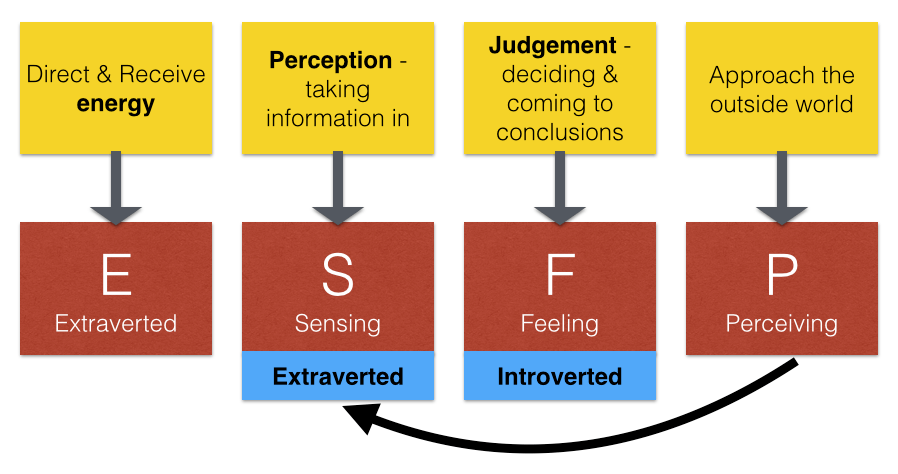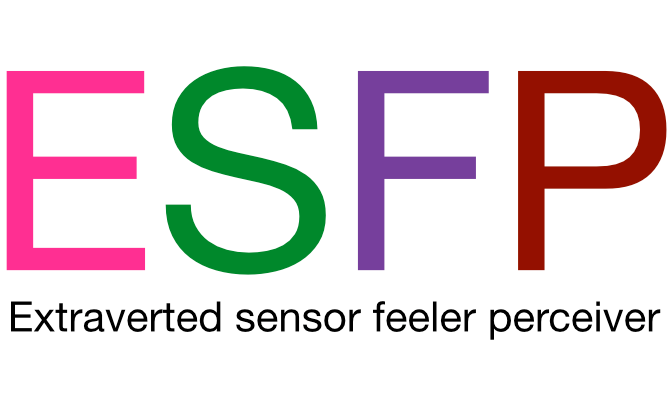The Perceiver element of the ESFP personality type means that Sensing is Extraverted with this personality type and Feeling is Introverted. The dominant function for them in their processing is how they take in information (perception) which in this case is through Sensing rather than Intuition.
Their preferred attitude and their preference for directing and receiving energy is Extraverted rather than Introverted, so they Extravert how they take in information (their Sensing). Extraverted Sensing is therefore their dominant preference and this will display itself in their personality:
Observant, active, practical, specific, realistic and involved in immediate experiences. Extraverted Sensors tend to like living in the present
As Extraverted Sensing is their dominant function so Feeling (rather than Thinking) is their next preference. They Introvert their how they decide and come to conclusions (Feelings) which leads to them being:
Sympathetic, warm, persuasive, optimistic, generous and tactful. The Introverted Feeling dynamic means that they like to focus on dealing with their own individual feelings and beliefs.

Their personality dynamic is therefore Extraverted Sensing with Introverted Feeling. Their third preference is Thinking and their inferior function is Introverted Intuition.
ESTPs may feel stress in the following situations and should therefore be on the alert for when:
- They sense a lack of delight in the present or lose physical health
- Their relationships are rocky or they lose their sense of purpose
- They must do long term planning or lots of speculation, creative problem solving
- Lose sense of self when helping others
When you are with an ESTP they will respond best to you if you:
- are warm
- friendly and responsive
- practical
- use common sense and give them concrete tasks that allow them to explore and have fun
- give them real involvement in the learning process and praise them when they do well
- Use hands-on, experiential development methods in action oriented group settings
Is ESFP not you? See all 16 types
[
Being an ESFP
Short Profile 1
Family member: Extrovert, Sensor, Feeler, Perceiver
This person is a hugger, likes to organise parties with family and friends, and is generally a cheerful person. They are more in the here and now, constantly analysing why things happen the way they do. I would say that they are playful, lively and stubborn, also gentle hearted and very kinaesthetic. They would also tell people when they disagree, but doesn’t like conflict in doing so. Punctuality is definitely not important to them, this drives me mad! If I arrange to meet them at a certain time you can bet you can add a half hour on when they turn up. Definitely easily distracted, and not particularly organised in their household affairs.
Profile 2
My husband prefers to recharge his batteries being with others, often speaks before thinking. He can often just blurt out something without really thinking about what he is going to say. He speaks what he feels right there and then. He seeks outside validation. However his introvert sides are just as equally strong for certain traits. He prefers not to hug people; he has few but really close friends. He prefers to sit it in the back of the room and be internally focused, at in example a seminar or event. During a break he enjoys being the center of attraction. With close friends or family he enjoys being the party organizer.
My husband has both N and S traits, he enjoys planning great things, is future focused, but once he is actually doing something, he often gets stuck in the details and is really hands on. He needs to do things himself in example a project he has planned. He reads magazines from beginning to end, and is extremely interested in facts, figures and statistics.
My husband is a feeler. His decisions are value based, and he is gentle hearted. He easily mistake criticism as something personal and gets quite upset if he feels he is being criticized by a judge (me in example.. who is more logical and firm minded) He is also kinesthetic, which relates to his sensory side needing to be hands on projects.
My husband is a Perceiver. I know because he does not consider plans to as important as I do. He might plan something and have a list – but then will easily get distracted and not consider the initial plan or list as so important anyway. He loves to explore unknown territories, and likes to keep his options open. He does not enjoy to settle firmly about something or idea – just incase something better comes up. He can often have made a decision – just to turn around a minute later because something has convinced him of something “better”. I often get confused and think he is indecisive. (As I am a person to make a decision and hardly ever change my mind)
Profile 4
My work colleague, with whom I collaborated for a time is:
Extrovert: need outside validation (showing is work and asking the other to validate it, speaking before to think…)
Sensor: he is more of a sensor, more in the now, not checking if things fit together, a lot in the details.
Feeler: Takes things personal quiet easily, is easily influenced and not so objective. Is also gentle hearted.
Perceiver and judger are very close: Not punctual although likes to make the world fit to him. Makes lists when it is about job to be done (but seems to be a way to push his perceiver side to not take over). He doesn’t like surprises and his patterns are easily predictable but he is also easily distracted.
Profile 5
If I think about my partner, I recognise that she is definitely extroverted as she is always thinking of other people.
Always wondering how her family members are who she doesn’t see so often. If someone is troubled she will keep them in mind and be concerned of their welfare. She is certainly very kinaesthetic. She often embraces her friends with hugs and loves to catch up with people whenever possible.
I can observe the sensor from within her when she takes time to explore the purpose of something and how useful it might be. When shopping she will compare different products by reading the details that describe them and look at how it will benefit her. She is definitely a feeler, she is driven by her internal state of emotion and uses her feelings as a guide in her life.
The perceiver stands out too when she demonstrates flexibility making plans. I often hear her friends ask about a get together and she will leave it to them to for when suits them. She will often go off on tangent according to how she feels.
Profile 6
When considering my own basic Meta Programs, I can identify that I am mostly extroverted. This however is subject to external circumstances and influences. I can recognise, when considering the continuum that I will shift between being introverted and extroverted at different times and with different people in different places. Sometimes when I am walking I will be so introverted that a UFO could land next to me and I would not realise it. Other times, when I am socialising with friends, I am extremely aware of each and every person in the room.
I can identify myself very much as a sensor. When I embark on a project I want to know the details and practicalities of what I am working towards. I want to know how to use and apply something to a given area. In my therapy work I consider means tested results and what will work. I am very existential and in the here and now moment, whilst maintaining awareness of the road I have travelled and what lies ahead.
My internal state tends to lean more towards being a feeler than a thinker. While I pay close attention to addressing problems and making decisions that are important, that rest of myself is quite impulsive. I tend to go with the feeling and flow of the moment. Often at the weekends, I prefer to take it as it comes and play it by feel rather than plan it all up. I realise that I am very flexible in my thinking, which allows me to adapt to situation and I will often be ok to work with what suits others.
My adaptation operator functions from a perceiver perspective dominantly. I like to have options that I can work around and make decisions that will flow. If I have a night out with friends planned, and they ask what I would like to do or where I would like to go. I would be likely to have a few options available as plan ‘B’ and ‘C’. it isn’t important to me to follow a set plan, I prefer to go with the flow.

